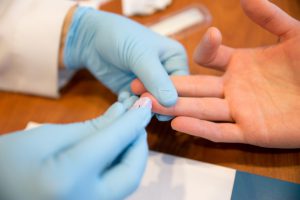
EPIC Director of Medical and Educational Services Bridget Narvaez
Today, you may be hearing more about Hepatitis on TV and in the news. This serious infection includes many types, harms the liver and may lead to death. Anyone can contract Hepatitis, but the Baby Boomer generation and many other populations are more at risk. Most people are unaware that they’re infected because it may be symptomless in the beginning.
Bridget Narvaez, MBA, RN, recently became the new director of medical and educational services at EPIC (Empath Partners in Care), a member of Empath Health. In recognition of Hepatitis Awareness Month, she discusses Hepatitis risk factors, symptoms, prevention and treatment; how to stay healthy living with Hepatitis and HIV, which often go hand-in-hand due to similar modes of transmission; and her team’s work providing HIV prevention education, testing and support services in the Tampa Bay community.
Q&A: EPIC Director and RN Bridget Narvaez
1. What’s your background?
I’m a St. Petersburg native. My background is working as a senior human resources generalist for about 10 years at a nonprofit agency. I’ve also done for-profit work.
I’ve always had a love for the health care field. I wanted to be a doctor after I graduated from high school and I had two brothers who were CNAs (certified nursing assistants) for quite some time. They’d tell me stories and were my inspiration to pursue health care. I went back to school and got my nursing degree. Once I passed my boards, I worked as an RN (registered nurse) at a hospital, in community nursing and on a Suncoast Hospice care team. I recently was promoted to my new position at EPIC.
2. What does your job entail?
I oversee our CRSC (Comprehensive Risk Counseling and Services) program and ETI (Expanded Testing Initiative) program. We provide testing, counseling, medical case management and education and prevention resources on all aspects of HIV/AIDS. Our work predominately is in Pinellas County, but also extends into Hillsborough and Pasco counties. My staff is great and enjoys informing and supporting the many people who are infected or affected by HIV/AIDS in our area.
Some days I assist my staff in going out in the community to talk with people about getting tested, their questions and our services. Other days I’m here in the office doing paperwork, behind-the-scenes planning with community partners and developing events and programs that continue to best serve the community.
3. What are your goals for your team?
The goals I definitely want to achieve are doing more events where we can help the community understand the importance of knowing their HIV status and learn about the wealth of programs offered through our Empath Health network.
I want to continue to get our name out there on both sides of the bay to make sure we give excellent care to our community. And I want to help decrease the stigma of HIV/AIDs and encourage people to get tested. All it takes is a simple blood test. You can get it done by your primary care doctor, our staff or the health department. Knowing is half the battle.
 4. What’s Hepatitis?
4. What’s Hepatitis?
Hepatitis is inflammation of the liver. It comes in many forms – viral, over consumption of alcohol or auto immune. I think a lot of people hear about Hepatitis C but there are also Hepatitis A, B, D and E. Hepatitis A and E are two acute forms via fecal/oral transmission through contaminated food or water. Hepatitis B can be acute to chronic, transmitted via blood or body fluids and linked to liver cancer. Hepatitis C can be acute to chronic and transmitted via blood, childbirth, sex or IV drug use.
Individuals might not know they have Hepatitis because there may not be any symptoms until it gets to a chronic state. Just like HIV, it’s important to get tested for Hepatitis.
5. Who’s most at risk for infection?
People who inject drugs are at great risk for contracting Hepatitis B and C. Populations at greater risk for Hepatitis C contraction include people born between 1945 and 1965 (Baby Boomers), health care workers, babies born to women with Hepatitis, men who have sex with men and people who received blood products for clotting problems before 1987. Anyone who eats anything contaminated or doesn’t practice good hand hygiene is at risk for contracting Hepatitis A and E.
“Most baby boomers are believed to have become infected in the 1960s through the 1980s when transmission of hepatitis C was highest,” according to a CDC Know More Hepatitis Fact Sheet. It further reported that some might have become infected from “medical equipment or procedures before universal precautions and infection control procedures were adopted” or “contaminated blood and blood products before widespread screening virtually eliminated the virus from the blood supply by 1992.”
6. What are the symptoms?
Hepatitis can be asymptomatic in the early stages. When it reaches a chronic state, there can be yellowing of the skin and sclera (white part of the eye), dark urine, abdominal pain due to the inflamed liver and any fluid build-up, distended abdomen, fever, loss of appetite and clay-colored stools.
7. Is it preventable and treatable?
There are preventative vaccines for Hepatitis A, B and D and prevention for Hepatitis A and E is good hygiene and food preparation.
There’s treatment for Hepatitis B and C, including a list of FDA-approved medications that must be prescribed by primary care doctors or health care providers. For some individuals, if it’s caught early enough it can resolve and clear through the liver with consistent medication regimens, rest and diet. For others, it depends on what’s going on with their bodies.
8. How does a Hepatitis infection affect those living with HIV?
It’s very important for people with HIV to also get vaccinated and tested for Hepatitis. A lot of times there may be coinfection because of the risk factors of injecting drugs or any incidence in which blood can be transferred.
“Nearly 75% of people with HIV who inject drugs also are infected with HCV,” according to a CDC June 2016 HIV and Viral Hepatitis Fact Sheet. Those who are coinfected are at greater risk for liver disease, liver failure and liver cancer. It’s definitely important that they get tested and understand that the medications they take for HIV can be harsh on the liver. Health care providers will need to evaluate all meds taken.
9. How can people living with HIV and Hepatitis stay healthy?
Most important is good hand-washing hygiene along with proper diet, adequate rest, exercise, and keeping up with medical appointments, medication regimens and lab testing to check for viral load and liver health. Some people feel like they can stop meds because they’re feeling better but they need to stay on their regimens until their health care providers say otherwise.
For HIV patients, it’s important to eat well, get rest and continue medical treatment to continue living a good quality of life. Especially with Hepatitis, people need to stay away from fatty food, fast food and take-out food because a fatty liver can occur.
 10. What are some other common coinfections with HIV?
10. What are some other common coinfections with HIV?
STIs (sexually-transmitted infections) and TB (tuberculosis) also are common with HIV. STIs are on an increase and we encourage the people we test for HIV to also get tested for other STIs.
11. What are some comorbidities of HIV?
Comorbidities (the simultaneous presence of two chronic diseases or conditions in a patient, per English Oxford dictionary) of HIV are chronic liver and kidney issues. That’s because the medications HIV patients are on can be very harsh on the liver and the kidneys.
12. What lessons have you learned?
The number one lesson I’ve learned is never say never. Since I started in nursing school, I’ve been exposed to quite a bit and helped people in many different conditions.
13. What’s most meaningful to you?
My joy is being able to help an individual. When I was a nurse working in the hospital and out in the field with patients, I loved being a resource and support. I talked with them about their health conditions, gave them information and served as a support with what they were going through. It’s important to me to go out in the community. That could be an opportunity to talk with someone who’s newly diagnosed and do everything possible to provide them the information and resources they need.
Take the Hepatitis Risk Assessment
The CDC recommends Hepatitis testing for everyone born 1945-1965. Take the confidential risk assessment here and talk with your doctor about getting tested for Hepatitis.
Get Tested for Hepatitis
The Florida Department of Health in Pinellas County will offer free Hepatitis screenings and education on National Hepatitis Testing Day on Friday, May 19 from 8:15 a.m. and 12 p.m. at its centers – 205 Dr. Martin Luther King Jr. St. N., St. Petersburg or 310 N. Myrtle Ave., Clearwater. Click here for more information.
Get Tested for HIV
Stop by one of our locations or our mobile unit to get tested for HIV. It’s free and confidential, no appointments are necessary and results can be ready in just 15 minutes.
